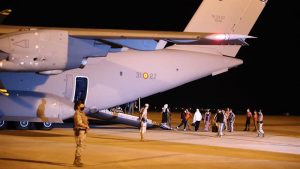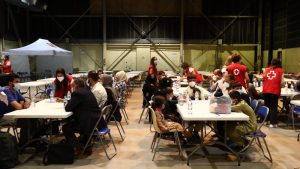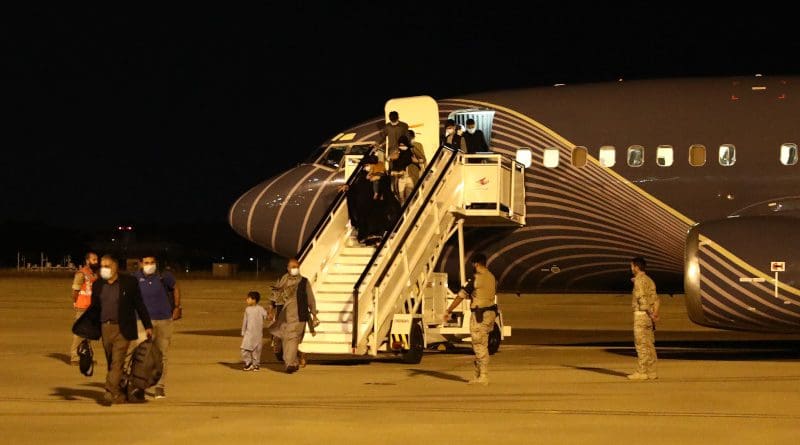First Group Of Spaniards And Afghan Collaborators Arrives In Madrid
The first group of Spaniards and Afghan collaborators arrived Thursday at the Torrejón Air Base in Madrid.
This group of 53 people, five of whom were Spaniards, arrived at 4:30 am from Dubai on board one of the A400 planes of the Armed Forces sent by the Spanish government. This flight concludes the first phase of the operation, which involves the departure of all Spanish citizens who are not essential for the evacuation.
The Ministers for Foreign Affairs, European Union and Cooperation, José Manuel Albares, and for Inclusion, Social Security and Migration, José Luis Escrivá, accompanied by the Chief of Defence Staff, Teodoro López Calderón, received them at the airport.
The next phase of the operation will be the evacuation of Afghan collaborators and family members who have worked with Spain in recent years, as well as leaders in defending human, women’s and children’s rights, and other activists.
Foreign Affairs Minister José Manuel Albares welcomed the return of the first to be evacuated. Albares explained that only the diplomats and security personnel needed to complete the entire evacuation process remain in the Afghan capital.
The Foreign Affairs Minister called for caution until the end of the evacuation operation, in order to preserve the safety of all those who still have to return to Spain. Albares said that Spain has all the necessary means of transport and communications ready to conclude the process in the next few days.

The Foreign Affairs Minister highlighted the work carried out by the Government of Spain and the “total coordination of the different ministries, with the leadership of the Prime Minister of Spain at all times”, to face “this challenge”, in reference to the extremely difficult circumstances that Afghanistan is going through.
“We have to continue working to evacuate the Afghans who have collaborated with Spain in the shortest possible time, and to guarantee the safety of all of them, as well as those who have worked with the EU and whose hub will be Madrid,” the minister said. “Spain has provided all the necessary means” for this, so “we will not give up”.
The minister stressed the particular importance of coordination with the various representatives of the international community.
In this regard, the head of Spanish diplomacy referred to the contacts held with the EU High Representative, Josep Borrell; the Secretary General of NATO, Jens Stoltenberg; his counterparts in the EU – with whom he shared the extraordinary council of Foreign Affairs Ministers -, as well as with other partners and allies of Spain in order to move forwards with the evacuation jointly.
EEAS flight from Rome
The minister also highlighted Spain’s role as a hub for the EU’s Foreign Affairs Service, through which Afghans who have collaborated with the EU will arrive in the country to be subsequently sent to different EU countries.
Within this framework of Spain’s collaboration with the EU, five families arrived in Madrid before midnight on an EEAS flight from Rome, the European External Action Service, to be sent to Denmark, Germany, Poland and Latvia.
Family protocol facility
For his part, José Luis Escrivá, who emphasised the inter-ministerial coordination for this operation, explained that the evacuees will be accompanied and cared for at all times by professionals from the State Secretariat for Migration and NGOs from the moment they arrive, thanks to a protocol for the families.
The head of Migration emphasised the work carried out to ensure that the reception in Torrejón was “as dignified and as welcoming as possible in the present circumstances. They have been collaborators of Spain and what we are doing is what we should be doing with such self-sacrificing people” who collaborated with our country, the minister said.

Escrivá explained the reception logistics in Torrejón. First of all, the arrivals undergo a Covid test carried out by Ministry for Health staff, before being identified by the police, at which point “they will declare their intention to request international protection”. They will then be handed over to the Ministry for Inclusion for reception. Subsequently, and within 72 hours, asylum seekers will be referred to the Ministry’s reception centres.
The repatriation plan designed by the Government, in which the Ministries for Defence, Foreign Affairs, Interior and Health also participate, contemplates a logistical deployment in military facilities, coordinated by the State Secretariat for Migration.
According to Escrivá, the Government has sufficient resources to assist applicants for international protection. The system currently has around 3,000 free places available throughout Spain. In addition, the minister thanked the regional governments and municipalities that have also offered their resources should they be needed.
Conditioned spaces
At the end of the runway, different perfectly equipped spaces have been set up to attend to the Afghan families. After identification and screening, they will be informed about international protection procedures.
In these temporary transit facilities, which can accommodate up to 800 people, there are separate areas for women, children and men, a dining room for 200 people, toilets and showers.
A space has also been set up for children to play, another for breastfeeding and feeding babies, and another for health and psychological care. All of them will be provided with food, drink, masks, and feminine and infant hygiene kits.

